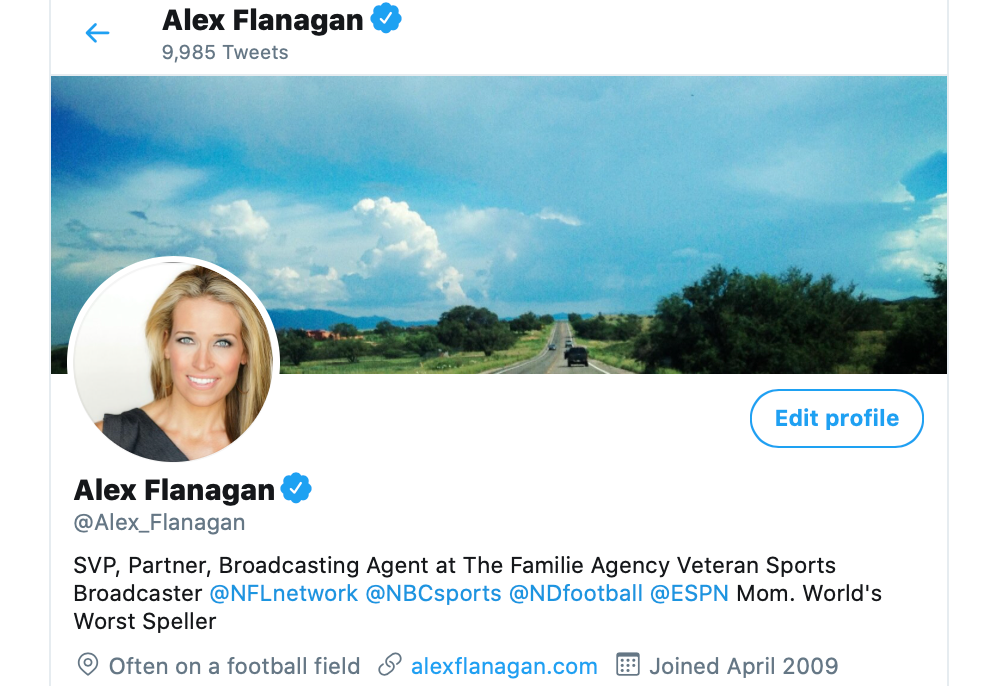
I was livid with my husband when he signed me up for a Twitter account in 2009 without asking me first. “We both work in industries where we need to stay current with technology,” He explained. It didn’t take long for me to change my tune. I’m thankful he introduced me early on to a social networking platform that changed the game in the sports and news broadcasting industry.
Traditional mediums, like TV or print, provide a one-way interaction. Social media is interactive, allowing you to communicate directly with followers in a personal way. If you are a reporter, writer, analyst, insider, or anchor, you HAVE TO be on Twitter. It has become a go-to news source for millions of people. Twenty-Five percent of verified Twitter accounts are journalists. Twitter is the perfect format for quickly sharing news snippets. It is also a good way to network within the industry.
Besides sports, I use it to stay up to date on local fire updates or determine whether or not the shaking I just felt was an earthquake. The immediacy of communication means information reaches viewers much quicker than traditional broadcasting. Tweets can go viral fast. There is no way to edit tweets after posting and while you can delete a post, remember it can still be screenshot and shared…even if you get rid of it. Like all social media, but especially on Twitter, when you are posting after something has stirred your emotions, that is an excellent sign to stop and think it through first. (Trust me!)
For sports broadcasters, the best use of the platform is for breaking news, providing opinions, commentary, and insight. Like all of your social media channels, it is a direct-distribution channel to your own audience. In the olden days, you needed a newspaper to print your words or a TV network to put you on the air to get your information out. You don’t’ need anyone other than Twitter to get a message across or share a story.
Like I wrote in my article about the importance of Instagram, growing a social media following is hard work. Audiences know when it is not authentic. It takes time and consistency.
There are 330 million monthly active users on Twitter. Twitter users skew older than Instagram and Snapchat. Almost 2/3 of Twitter users are 35 or older, so it is a more mature audience.
The goal for broadcasters is to build a curated group of followers that care about you and what you share. I was fortunate to build a strong following of Notre Dame fans because I covered the football team for seven years. That group has been a great supporter of my career, even after leaving the job covering the program.
QUICK TWITTER TIPS:
- Your Twitter handle should be as close to your name as possible.
- Bios matter: write a brief, original, and accurate description of who you are and what you do. Search engines like google, index bios, so you want to include keywords like NFL or ESPN if you work for ESPN covering the NFL.
- Use a headshot for your profile picture so people can easily identify you.
- Watch with your audience: one of the most effective ways to build an audience is to live tweet. It allows you to share in the experience of a game with fans. While watching a game or event start a conversation with your followers by sharing your thoughts and knowledge and asking your followers what they are seeing and thinking.
- Tweet supplementary information, research, storylines, stats, and other things that didn’t make it into the broadcast, the show, or article.
- Find common ground with followers: sports fans are passionate people. It is easy to create conversations or bond over athletes and teams.
- Post pictures or visual content along with your words. Visuals perform better than words alone.
- Use hashtags: think of what people might be searching for that would match your tweet. #Lakers #Colts #NFL #Superbowlsunday
- Engagement and consistency are the keys to building a following. Follow people you like and enjoy and then retweet, like, and comment on their posts.
- Have a thick skin: there is nothing easy about reading vile, rude, hateful, and critical comments about yourself that are sadly an inevitable part of social media. In my early days on Twitter, a post comparing my teeth to a horse got some speed. I had always loved my teeth, and it never occurred to me; they were too big! That stupid tweet hurt me for a long time. I’ve since become disciplined to only take feedback from people in the arena that I respect.
- Be kind: If you wouldn’t say it to someone’s face, don’t tweet it.
- Be respectful of your audience: know why people follow you and what they want from you.
I asked some of my own Twitter followers to recommend some of their favorite accounts.